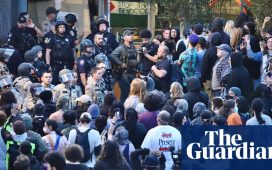A school board composed mostly of Orthodox Jewish parents has favored students in private religious schools over mostly black and Latino students in public schools, civil rights groups have alleged in federal court.
The groups, including the American Civil Liberties Union and the NAACP, blame a school board election system that is common across the US and that, they say, disenfranchises minorities.
Since 2005, the East Ramapo school board, which covers a few small towns an hour’s drive north-west of New York City, has been controlled by members who represent yeshivas, or private Jewish religious schools, according to a report by the New York state education department. The vast majority of the 26,500 children who attend private schools in the district are white. In contrast, 91% of the 9,000 or so children enrolled in public schools are black and Latino.
In 2009, the board began gutting the public-school system, the report states. Between 2009 and 2014, the board fired over 450 staff, including 160 teachers, three guidance counselors and all social workers. It also cut budgets for athletic and extracurricular activities in half.
Children have had to attend classes with no teachers, which the school called “study hall” or “home room”, said Terry Rodriguez, a parent with three children in the school district. Her son, 17, was in one of these classes for his first three months at Spring Valley high school.
“My children weren’t getting the proper education they need,” she said.
But as public schools suffered, funding for the private yeshivas went up. Between 2010 and 2014, spending for private school buses increased from $22m to $27.3m. The school board also increased funding for special education in private schools by 33% while laying off 15 special education teachers in public schools, according to the NYSED report.
School board representatives declined requests to comment, citing the ongoing litigation. Yehuda Weissmandl, the board’s former president, said in a 2014 statement that the board had no choice but to cut the public school budget owing to declining funds. Yet while there was a decline in state funding after the 2008 recession, the report found that no meaningful effort had been “made to distribute pain of deep budget cuts fairly among private and public schools”.
“It’s frustrating and I think the community is really at a boiling point,” said Antonio Luciano, a resident who ran for a seat on the school board in 2010 and 2011. The former NYPD lieutenant had promised to restore the budget for public schools but was defeated both times.
No candidate preferred by minority groups has won since 2007, according to the New York Civil Liberties Union (NYCLU). This is because the board’s nine members are elected “at-large”: instead of each neighborhood electing its own representative, the entire district votes for every member on the board.
In East Ramapo, 62% of the population is white and votes cohesively in favor of private school candidates, according to Perry Grossman, a voting rights lawyer for the NYCLU and co-counsel in the suit against the East Ramapo Central School District.
“In every single election, a very large bloc of white voters was voting for the winning candidates and in every election a very large bloc of black and Latino voters who voted for losing candidates,” he said.
Since the NYCLU filed the lawsuit in November 2017, two minority candidates have been elected to the school board.
At-large voting takes place in 80% of city and one-third of county elections across the US. It was instituted in southern states to suppress black votes, said Leah Aden, deputy director of litigation at the NAACP Legal Defense Fund (LDF). In 2014, LDF won a suit in federal court to replace at-large voting in Fayette county, Georgia, where not a single black candidate had served on a school board or country commission in the county’s 200-year history, despite constituting one-fifth of the population.
To fix the East Ramapo issues, Grossman is calling for a switch to single-member districts. In this system, the school district in East Ramapo would be divided into multiple neighborhoods, each of which would elect their own board member.
“When children grow up seeing only people who look different than them in political office, they may not think politics is for them, or believe in the democratic system and that elected representatives are faithfully doing their best to represent them,” said Sarah John, a political science researcher and project manager at Virginia Commonwealth University.




